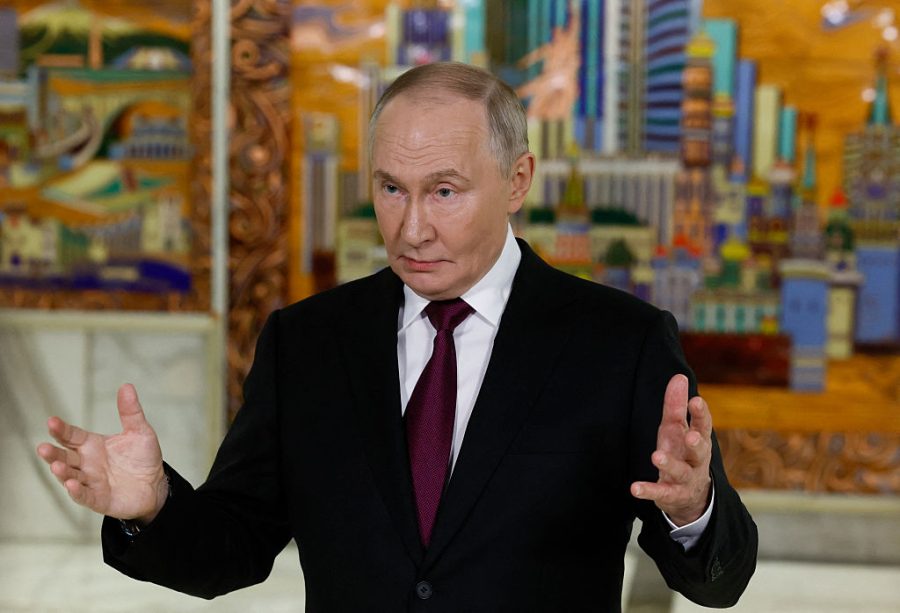There was some light booing on the first night of English National Opera’s The Elixir of Love, but it was the good kind – the friendly kind, aimed not at the baritone Dan D’Souza but his character, the caddish charmer Belcore. In other words, it was what opera snobs call ‘pantomime booing’, and which, as a peculiarly British phenomenon, they affect to deplore. If it happened in Munich or Milan they’d brandish it as evidence of an advanced opera-going culture – proof that an audience has been so completely transported by a performance that they’re reluctant to step out of its world. But any singer who’s remotely familiar with British theatrical traditions knows that it’s a compliment, and D’Souza beamed. It had been a thoroughly good-natured evening all round.
Dunking on The Elixir of Love would be like slapping a puppy
Which was as it should be, because The Elixir of Love is pure operatic romcom. Donizetti is out to charm and entertain and so is ENO, though at times Harry Fehr’s production – updated to rural England during the second world war – tries slightly too hard. Adina (Rhian Lois) owns a stately home where a battalion of land girls has been billeted.
Belcore and his military pals are moustachioed flyboys from a nearby RAF base, and Dulcamara (Brandon Cedel) is a spiv in a striped suit. Skies are blue, haircuts are distinctly non-regulation and if the set-up seems a little too neat to be true we can relax because the first thing we see is a huge animated TV screen. This isn’t real wartime, apparently, but a Dad’s Army-style sitcom, allowing the whole concept to have its Victoria sponge and eat it.
Well, ENO needs to replenish its store cupboard of bankable, revivable standard rep. Fehr’s Elixir looks pleasant (designs are by Nicky Shaw) and there’s plenty of scope for personalisation by future casts. Working against it is ENO’s old enemy, the Coliseum stage, which is so big that it takes a long time for the comedy to come to a simmer. (It never really comes to a boil – it isn’t that kind of opera buffa.) Certainly – and this is hardly unknown on opening nights – it seemed to motor along rather more convincingly after the interval. You could almost feel the audience warming up.
In fairness, the conductor Teresa Riveiro Bohm had found the mood and pace from the start – bouncy, svelte, with neatly turned corners – and the cast is very likeable. D’Souza brought a hint of camp to Belcore (his aides brought rather more than a hint) and sang with a handsome swagger.
Cedel, meanwhile, cheerfully runs away with the show – a big sunny transatlantic presence who never let his patter get out of control and was barely cynical at all. Vocally, he clicked particularly nicely with Lois’s flame-headed, Mitford-adjacent heiress, whose crestfallen tenderness in Act Two (earlier, we’d seen her shredding a bunch of flowers and dispatching a teddy bear with extreme prejudice) was touching and genuinely sweet.
Lois can really float a quiet, expressive phrase; and as Nemorino, Thomas Atkins had hidden reserves too – plangent and shapely in ‘Una furtiva lagrima’ (a basic entry requirement in this role) but capable of scaling the heavens, or at least, the upper balcony, with some tingly top-notes as his character evolved from pullover-wearing underdog to all-in romantic hero. ‘A concoction that’s impossible not to love’ declares ENO’s publicity, and dunking on The Elixir of Love would be like slapping a puppy. You want feel-good? This is feel-good. I suspect we’ll be seeing it again.
Just a word about Hampstead Garden Opera’s production of Eugene Onegin. The Jacksons Lane theatre is pretty basic – really just a studio space – and Eleanor Burke’s staging was upfront and raw, placing the action amid vodka-swilling north London teens and in doing so, honouring Tchaikovsky’s own wish that Onegin should be an opera for, as well as about, the young.
Hasmik Harutunyan (Tatyana), Matthew Curtis (Lensky) and Jolyon Loy (a very relatable and modern Onegin) all sang and acted with thrilling directness, in a venue that gave them nowhere to hide. It was the sort of night that made you want to go out and drag in an opera-sceptic, just to watch their prejudices being blasted away at storm force.
Oliver Cope conducted a rich-sounding 12-piece orchestra, using an arrangement created by Jonathan Lyness for Mid Wales Opera a few years back. HGO operates very effectively without public subsidy, but MWO can’t. Rural Powys is not Hampstead, and MWO is still struggling in the face of ideologically motivated defunding by the Welsh Arts Council. Yet Eugene Onegin is possible in Highgate now because it was done in Hereford then. The Arts Council of England prates about the supposed lack of a joined-up ‘ecology’ in UK opera. I wonder if they sent anyone to see either production?








Comments